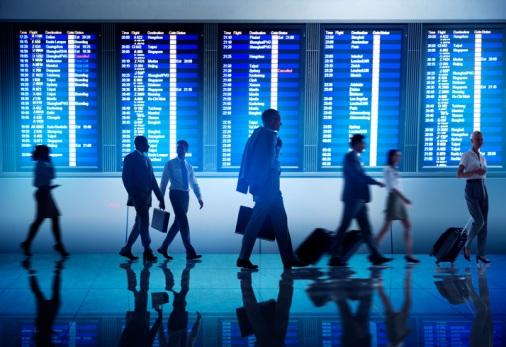How companies are protecting employees travelling in 2nd Covid year

- Hazards on business trips: infection, quarantine, crime
- Tips: making use of databases and apps, setting up own test centres
- HDI helps: With Corporate Travel as an all-in-one solution with assistance package and insurance cover
The uncertain development of the COVID-19 crisis presents huge challenges for going on business trips in 2021. In some countries, infections are falling, while in other regions, mutated viruses are undergoing a rapid spread. This makes travel planning extremely challenging. Furthermore, other hazards are coming to the fore in some target regions. The most consequential of these risks is falling victim to a criminal act of some kind. Industrial insurer HDI Global is helping companies to manage and overcome these challenges.
“COVID-19 has exerted a profound change in behaviour on corporate travel,” reported Christoph Schulz, Head of the Group Personal Accident line at industrial insurer HDI Global. “In 2020, the number of journeys fell substantively. In spite of this, emergencies arising on foreign trips remain a critical topic. Most significantly, we saw a disproportionate level of medical emergencies and lots of security emergencies.”
The safety requirements of travelling employees have increased noticeably, and the employer's duty of care is much more important than before the pandemic. Therefore, now is the right time to establish an internal travel management system or to intensively review existing processes.
Risks
In 2021, HDI perceives five major risks to business trips:
- Catching infections while travelling (local suburban transport, rail, flights)
- Catching infections at the destination in a hotel or with a customer (from personnel or guests)
- Catching infections during leisure time (here primarily when shopping)
- Unwanted periods of quarantine due to contact with an infected person (e.g. already on the plane)
- Incorrect documents (negative test, proof of urgency, visa) in order to provide a legitimate reason for entry to a country (out of lack of awareness)
A significantly underestimated risk is represented by quarantines after contact with a person who tested positive for COVID-19 either already on the aircraft or shortly after arriving in the destination country. This is because tracking of contacts and particularly passenger lists is working very well in most countries (even in less industrialised regions). A business trip scheduled to take three days quickly turns into a compulsory two-week quarantine stay for the contact persons.
Tips
HDI Global recommends that companies should take the following rules into account when they are making plans for business trips:
- Make use of a professional country database which presents the overall risk, information on entering a country in relation to the coronavirus, entry restrictions, local hygiene rules, other medical risks and security risks
- Get in contact with the chambers of foreign trade and commerce of your target countries and clarify possible exceptions for entry
- The “Reopen EU” app gives a good overview of the options available for entering countries in Europe
- Set up your own Coronavirus testing station or cooperate with a company you are on good terms with or at least two laboratories in your region. These centres should also be open at the weekend (for travellers returning home on a Friday evening)
- Give your employees easily comprehensible conduct guidelines which are aligned with the chronology of the travel itinerary: measures before take-off, during the flight, on arrival, in the hotel, at the customer, during leisure time and on the return journey. Tips on hygiene in the hotel and at the customer are very important
- Duty of care is anchored in almost every legal system of the world. In Germany, briefings in accordance with the Articles 1-9 of the Industrial Safety Act (ArbSchG) should be put in place. In other words, personal risk assessment analyses should be carried out with the travellers before they depart. The United States Tort Law or UK’s Corporate Manslaughter and Homicide Act punish failures to comply with labour law. France also is very sensible if employers do not assess and mitigate potential risks of business travellers. Occupational health advice is also an important part of this process when making arrangements for activities with particular special conditions relating to hygiene and climate .
HDI Global also recommends developing company-specific travel safety guidelines. The company should use such guidelines to outline the range of prevention measures that have to be taken for specific country risk categories. Furthermore, employers should inform employees about the support services available from work before they leave on business trips and they should also highlight the individual duties and obligations incumbent on employees going on business trips.
Information and knowledge management is important
Companies need to place in-depth engagement with the issue of return-journey regulations, and test and reporting obligations in expert hands. It’s not possible for any employee to draw up this kind of complex overview “on the side”.
Business travellers are also recommended to use COVID alert apps – particularly those that are widespread in the particular destination country. Travellers should continue to use the relevant app on their mobile device for at least ten days after returning from abroad. A prerequisite for this is that the IT Department permits the app to be downloaded, the provider contract allows data roaming abroad, and employees activate Bluetooth and localisation functions on their mobile device.
These IT conditions also apply to the scans of QR codes necessary for many places in order to be able to visit a department store or a restaurant abroad or to install a government tracking app. In many companies, employees on business trips still have to rely on their private mobile phone for this purpose. This often generates serious breaks in the security architecture of the trip because of accounting for the costs and frequently also technical problems.
Outlook for travel in the business environment
According to assessments by Litehouse Consulting, vaccinations will not stop the virus completely until vaccination rates of at least 65 percent are achieved and maintained. As a specialist for travel risk management, the company bundles experiences from more than 9000 travel preparations and security briefings over the past 15 years. “The global travel flows will favour further mutations,” explained Oliver Hirt from Litehouse Consulting. “At the current point in time, global herd immunity is not foreseeable. A critical factor also continues to be the unsolved question: are vaccinated people infectious or not?”
According to Hirt’s assessment, a stamp recording coronavirus vaccination will have a fixed place in the vaccination passport for the next ten years. Measures to protect against (re)infection will therefore also continue to be necessary for a long time. He continued by saying that different regions would have to anticipate further COVID waves, particularly in cold seasons of the year. Only the strength of these waves could be weakened.
Insurance solution for Corporate Travel
Litehouse Consulting as an in-field expert was significantly involved in development of the “Corporate Travel” insurance solution of HDI Global. This relates to an all-in-one solution developed from the customer’s perspective. It enables companies to provide comprehensive support and protection to employees when they are on business trips. It offers important information services for business travellers, 24/7 emergency assistance, a security package and an insurance policy for potential financial loss. Corporate Travel not only supports companies in fulfilling their duty of care (risk analysis, security instruction, reconnaissance, labour law, and social security requirements) towards their employees globally, but also offers a high level of security through the integrated services, especially in times of dynamically changing framework conditions.
Authored by HDI Global
About HDI Global SE
Companies from the trading, production and service industries need an insurance partner they can rely on.
As part of the Talanx Group, HDI Global SE has been one of the leading insurers offering a broad and needs-based range of insurance solutions and accompanying services for decades.
HDI operates through foreign branches, subsidiaries and affiliates as well as network partners in more than 150 countries, offering international industrial insurance programmes.

